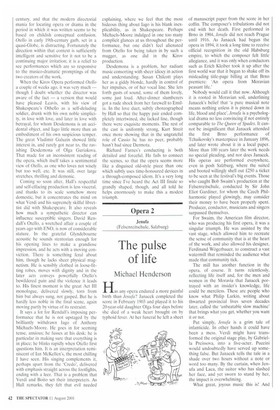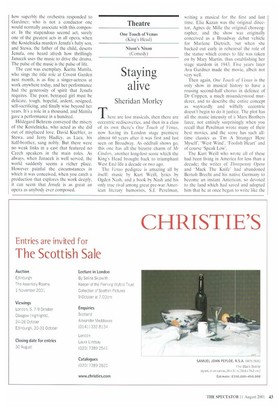Opera 2
Jenufa (Felsenreitschule, Salzburg)
The pulse of life
Michael Henderson
Has any opera endured a more painful birth than Jenufa? Janacek completed the score in February 1903 and played it to his 20-year-old daughter Olga four days before she died of a weak heart brought on by typhoid fever. At her funeral he left a sheet of manuscript paper from the score in her coffin. The composer's tribulations did not end with her death. First performed in Brno in 1904, Jenufa did not reach Prague until 1916. As Janacek had begun the opera in 1894, it took a long time to receive official recognition in the old Habsburg empire, to which the composer felt little allegiance, and it was only when conductors such as Erich Kleiber took it up after the first world war that it began to shake off its misleading title-page billing at that Brno premiere: An opera from Moravian peasant life.'
Nobody would call it that now. Although it is rooted in Moravian soil, underlining Janacek's belief that 'a pure musical note means nothing unless it is pinned down in life, blood and place', Jenufa is a psychological drama no less convincing if not entirely comparable to The Queen of Spades. It cannot be insignificant that Janacek attended the first Brno performance of Tchaikovsky's masterpiece in January 1896, and later wrote about it in a local paper. More than 100 years later the work needs no special pleading, and nor does Janacek. His operas are performed everywhere, even in posh Salzburg, where the suited and booted willingly shell out UR a ticket to be seen at the festival's big events. Those who caught Bob Swaim's production at the Felsenreitschule, conducted by Sir John Eliot Gardiner, for whom the Czech Philharmonic played glowingly, may consider their money to have been properly spent. Producer, conductor, musicians and singers surpassed themselves.
For Swaim, the American film director, who was producing his first opera, it was a singular triumph. He was assisted by the vast stage, which allowed him to recreate the sense of community that is at the heart of the work, and also allowed his designer, Ferdinand Wogerbauer, to construct a vast watermill that reminded the audience what made that community tick.
The mill has another function in the opera, of course. It turns relentlessly, reflecting life itself and, for the men and women in the Moravia that Janacek portrayed with an insider's knowledge, life could be merciless. These are people who know what Philip Larkin, writing about thwarted provincial lives seven decades later, called the 'unbeatable slow machine' that brings what you get, whether you want it or not.
Put simply, Jenufa is a grim tale of infanticide. In other hands it could have been a mess. Verdi might have transformed the original stage play, by Gabriella Preissova, into a five-acter. Puccini would undoubtedly have served up something false. But Janacek tells the tale in a shade over two hours without a note or word too many. By the curtain, when Jenufa and Laca, the suitor who has slashed her face, and yet sworn to stand by her, the impact is overwhelming.
What great, joyous music this is! And how superbly the orchestra responded to Gardiner, who is not a conductor one would normally associate with this composer. In the stupendous second act, surely one of the greatest acts in all opera, when the Kostelnicka murders Jenufa's baby son. and Stewa, the father of the child, deserts Jenufa, one heard afresh how thrillingly Janacek uses the music to drive the drama. The pulse of the music is the pulse of life.
The cast was exemplary. Karita Manila. who sings the title role at Covent Garden next month, is as fine a singer-actress at work anywhere today, and her performance had the generosity of spirit that Jenufa requires. The poor, betrayed girl must be delicate, tough, hopeful, ardent, resigned, self-sacrificing, and finally wise beyond her years. It's a role in a thousand. and Mattila gave a performance in a hundred.
Hildegard Behrens conveyed the misery of the Kostelnicka, who acted as she did out of misplaced love. David Kuebler, as Stewa. and Jerry Hadley, as Lam his half-brother, sang nobly. But there were no weak links in a cast that featured no Czech speakers in the main roles. As always, when Janacek is well served, the world suddenly seems a richer place. However painful the circumstances in which it was conceived, when you catch a production that explores the work deeply, it can seem that Jenufa is as great an opera as anybody ever composed.



























































 Previous page
Previous page